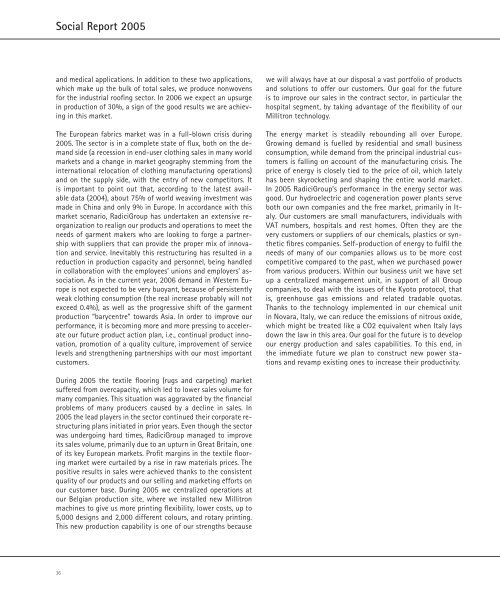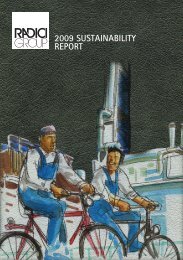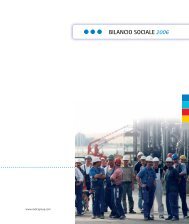Bilancio Sociale 2005 Social Report 2005
Bilancio Sociale 2005 Social Report 2005
Bilancio Sociale 2005 Social Report 2005
Create successful ePaper yourself
Turn your PDF publications into a flip-book with our unique Google optimized e-Paper software.
<strong>Social</strong> <strong>Report</strong> <strong>2005</strong><br />
and medical applications. In addition to these two applications,<br />
which make up the bulk of total sales, we produce nonwovens<br />
for the industrial roofi ng sector. In 2006 we expect an upsurge<br />
in production of 30%, a sign of the good results we are achieving<br />
in this market.<br />
The European fabrics market was in a full-blown crisis during<br />
<strong>2005</strong>. The sector is in a complete state of fl ux, both on the demand<br />
side (a recession in end-user clothing sales in many world<br />
markets and a change in market geography stemming from the<br />
international relocation of clothing manufacturing operations)<br />
and on the supply side, with the entry of new competitors. It<br />
is important to point out that, according to the latest available<br />
data (2004), about 75% of world weaving investment was<br />
made in China and only 9% in Europe. In accordance with this<br />
market scenario, RadiciGroup has undertaken an extensive reorganization<br />
to realign our products and operations to meet the<br />
needs of garment makers who are looking to forge a partnership<br />
with suppliers that can provide the proper mix of innovation<br />
and service. Inevitably this restructuring has resulted in a<br />
reduction in production capacity and personnel, being handled<br />
in collaboration with the employees’ unions and employers’ association.<br />
As in the current year, 2006 demand in Western Europe<br />
is not expected to be very buoyant, because of persistently<br />
weak clothing consumption (the real increase probably will not<br />
exceed 0.4%), as well as the progressive shift of the garment<br />
production “barycentre” towards Asia. In order to improve our<br />
performance, it is becoming more and more pressing to accelerate<br />
our future product action plan, i.e., continual product innovation,<br />
promotion of a quality culture, improvement of service<br />
levels and strengthening partnerships with our most important<br />
customers.<br />
During <strong>2005</strong> the textile fl ooring (rugs and carpeting) market<br />
suffered from overcapacity, which led to lower sales volume for<br />
many companies. This situation was aggravated by the fi nancial<br />
problems of many producers caused by a decline in sales. In<br />
<strong>2005</strong> the lead players in the sector continued their corporate restructuring<br />
plans initiated in prior years. Even though the sector<br />
was undergoing hard times, RadiciGroup managed to improve<br />
its sales volume, primarily due to an upturn in Great Britain, one<br />
of its key European markets. Profi t margins in the textile fl ooring<br />
market were curtailed by a rise in raw materials prices. The<br />
positive results in sales were achieved thanks to the consistent<br />
quality of our products and our selling and marketing efforts on<br />
our customer base. During <strong>2005</strong> we centralized operations at<br />
our Belgian production site, where we installed new Millitron<br />
machines to give us more printing fl exibility, lower costs, up to<br />
5,000 designs and 2,000 different colours, and rotary printing.<br />
This new production capability is one of our strengths because<br />
36<br />
we will always have at our disposal a vast portfolio of products<br />
and solutions to offer our customers. Our goal for the future<br />
is to improve our sales in the contract sector, in particular the<br />
hospital segment, by taking advantage of the fl exibility of our<br />
Millitron technology.<br />
The energy market is steadily rebounding all over Europe.<br />
Growing demand is fuelled by residential and small business<br />
consumption, while demand from the principal industrial customers<br />
is falling on account of the manufacturing crisis. The<br />
price of energy is closely tied to the price of oil, which lately<br />
has been skyrocketing and shaping the entire world market.<br />
In <strong>2005</strong> RadiciGroup’s performance in the energy sector was<br />
good. Our hydroelectric and cogeneration power plants serve<br />
both our own companies and the free market, primarily in Italy.<br />
Our customers are small manufacturers, individuals with<br />
VAT numbers, hospitals and rest homes. Often they are the<br />
very customers or suppliers of our chemicals, plastics or synthetic<br />
fi bres companies. Self-production of energy to fulfi l the<br />
needs of many of our companies allows us to be more cost<br />
competitive compared to the past, when we purchased power<br />
from various producers. Within our business unit we have set<br />
up a centralized management unit, in support of all Group<br />
companies, to deal with the issues of the Kyoto protocol, that<br />
is, greenhouse gas emissions and related tradable quotas.<br />
Thanks to the technology implemented in our chemical unit<br />
in Novara, Italy, we can reduce the emissions of nitrous oxide,<br />
which might be treated like a CO2 equivalent when Italy lays<br />
down the law in this area. Our goal for the future is to develop<br />
our energy production and sales capabilities. To this end, in<br />
the immediate future we plan to construct new power stations<br />
and revamp existing ones to increase their productivity.






